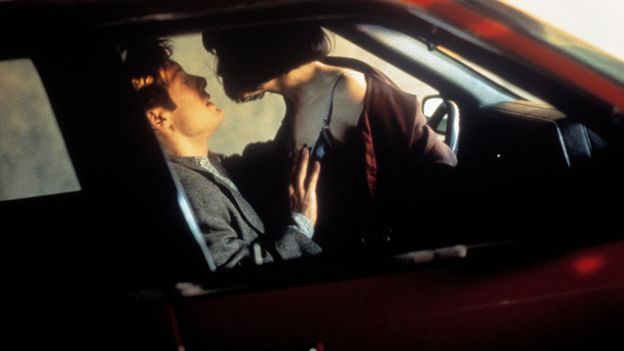The erotic thriller that still shocks


One of the more troubling aspects of the film is the fact that it dwells hardly at all on the chief consequence of engineering car crashes for sexual pleasure, namely that innocent people get killed. Indeed, Daily Mail journalist Christopher Tookey correctly countered Cronenberg’s observation that all the sex acts in the film are consensual: as he pointed out, the sex acts themselves might be, but the crashes – an intrinsic part of the frisson – most definitely are not.
How it stands up today
Cronenberg’s absolute commitment to showing, not telling, and his refusal to adorn the film with any visible moral framework, a responsibility he entrusted to the audience, made the film feel radically uncompromising. Crash was unquestionably sui generis: BBFC head James Ferman said it was “a one-off”, and that “there’d never been anything [like it]… we couldn’t compare it to anything”. But by that same token, Crash also felt like a culmination, too final and absolute in its ideas (and the execution of its ideas) to act as a departure point for any other filmmakers to follow. It created a genre that only it occupied – until this year, that is, when Julia Ducournau’s Titane appeared. Faring better than Crash at the Cannes Film Festival by actually winning the Palme d’Or, Titane also links sex, cars and violence, while updating certain of Crash’s themes for the 21st Century and making technology seem even more giddily invasive: for one thing, Titane’s protagonist has sex with, not just in, a car.
Nonetheless, Crash remains sexually transgressive. Though it broke no boundaries for sexual explicitness, it unmoored sex in cinematic terms from its biological underpinnings, from its conventional association with romance, and from being any kind of plot point or crowd-pleaser. Alexander Walker may have complained that the characters are “defined solely in terms of their sexual obsessions”, but for Cronenberg, this was part of the point. “The sex scenes are the movie,” he said in one interview. “If [viewers] resist watching them for narrative, for character development, for the texture… they don’t get the movie.”
Many audiences were also not prepared for the sexualised depiction of its disabled character, Gabrielle. On the one hand, there was a view that this portrayal was offensive, amounting to what Tookey called “orthopaedic fetishism”. But on the other, the BBFC, being mindful of this, screened the film to a group of 11 disabled people and found that while “the invited group did not generally enjoy the film, they concluded that its depiction of disabled people as being able to be both sexually attractive and active [was] generally a positive thing.” What’s more, Cronenberg told the BBCs Heart of the Matter that “I’ve had several people write me and call me saying that for the disabled, [Gabrielle] is an icon, a heroine, because she is someone who refuses to become a withered, sexless creature [after her] accident; in fact, she is very proud and strong in her own sexuality and eroticism, and is trying to incorporate her own body into her sexuality, rather than trying to cover up or pretend [her disability] is not there.”
Indeed, one of the most intriguing readings of Crash is that it is perversely hopeful. Viewed now, at a time when the pervasive sexlessness of mainstream cinema is regularly bemoaned by cineastes, Crash seems especially bracing: its characters will do anything for sexual connection with a consenting partner. To many viewers, this is overwhelmingly dark. But Cronenberg for one sees things differently. “Personally, I don’t think the movie is depressing at all,” said the Canadian provocateur in an interview with American Cinematographer. “The characters don’t just cave into the empty, lifeless situation that they find themselves in. They seek life, even if they’re seeking it through death or danger. And I think that’s very human.”
Love film and TV? Join BBC Culture Film and TV Club on Facebook, a community for cinephiles all over the world.
If you would like to comment on this story or anything else you have seen on BBC Culture, head over to our Facebook page or message us on Twitter.
And if you liked this story, sign up for the weekly bbc.com features newsletter, called The Essential List. A handpicked selection of stories from BBC Future, Culture, Worklife and Travel, delivered to your inbox every Friday.








